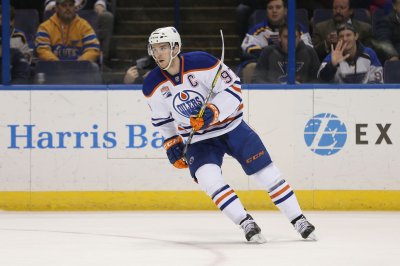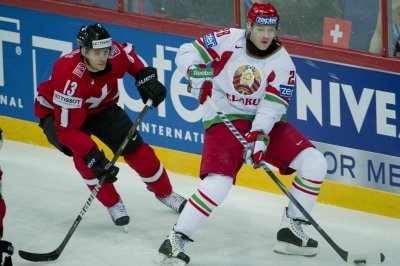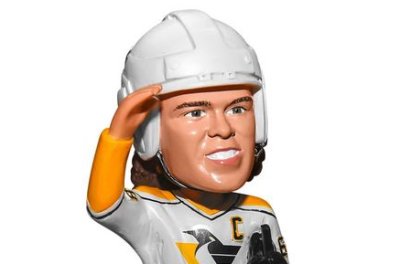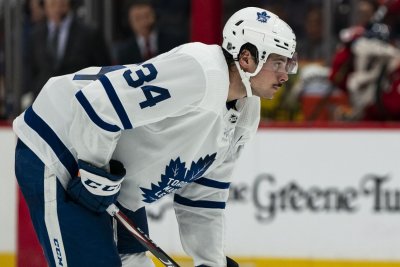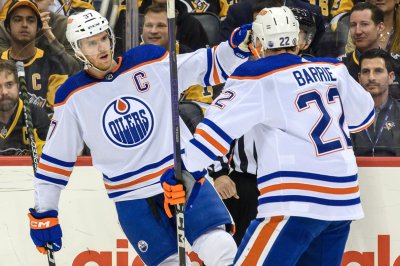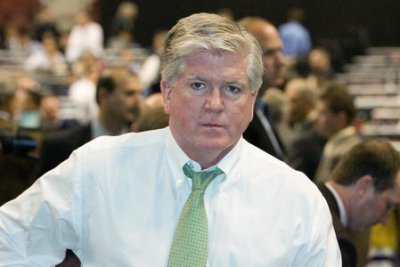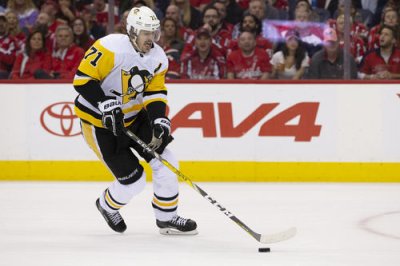Topic: Mario Lemieux
Quotes
After seven years of trying to work out a new arena deal exclusively in Pittsburgh, we need to take into consideration the long-term viability of the team and begin discussions with other cities that may be interested in NHL teams
Lemieux may move Penguins out of Pa. Dec 21, 2006
The time is right because I can no longer play the game at the level I'm accustomed to
Hockey Hall of Famer Mario Lemieux retires Jan 24, 2006
I am feeling pretty good, actually. I have been feeling pretty good the last couple of days with the medication I am taking now
Lemieux to miss Olympics Dec 10, 2005
I was optimistic that the injury would heal, and I was hoping to get back in the lineup and play with some of our very promising young players
Pens' Mario Lemieux out for the season Jan 06, 2004
I feel great, I've been working out, and I'm really looking forward to getting back on the ice
Lemieux to continue to play next season Jul 31, 2003
Mario Lemieux, OC, CQ (born October 5, 1965) is a former Canadian professional ice hockey player. He is acknowledged to be one of the best players of all time. He played 17 seasons as a forward for the Pittsburgh Penguins of the National Hockey League (NHL) between 1984 and 2006. A gifted playmaker and fast skater despite his large size, Lemieux often beat defencemen with fakes and dekes. He is currently the Penguins' principal owner and chairman of the board, having bought the team out of bankruptcy in 1999. He is the only person ever to win the Stanley Cup as both a player and an owner.
Lemieux led Pittsburgh to two Stanley Cups in 1991 and 1992, won a Stanley Cup as a chairman in 2009 with the Penguins, led Canada to an Olympic gold medal in 2002, a championship at the 2004 World Cup of Hockey, and a Canada Cup in 1987. He won three Hart Trophies as the NHL's most valuable player during the regular season, six Art Ross Trophies as the league's leading scorer, and two Conn Smythe Trophies as playoff MVP. At the time of his retirement, he was the NHL's seventh-ranked all-time scorer with 690 goals and 1,033 assists. He is the NHL's all-time record-holder for goals scored per game played, averaging 0.750 goals per game for his entire career. In 2004, he was inducted into Canada's Walk of Fame. Playing only 915 out of a potential 1428 regular season NHL games, Lemieux's career was plagued by health problems. His numerous ailments included spinal disc herniation, Hodgkin's lymphoma, chronic tendinitis of a hip-flexor muscle, and chronic back pain so severe that other people had to tie his skates. He has retired twice because of his health (and also missed an entire season because of it prior to his first retirement): first in 1997 after battling lymphoma (he returned in 2000), and for a second and final time in 2006, after being diagnosed with an atrial fibrillation. Despite his lengthy absences from the game, his play remained at a high level upon his return to the ice; he won the Hart Trophy and scoring title in 1995–96 after sitting out the entire previous season, and he was a finalist for the Hart when he made his comeback in 2000.
The Hockey Hall of Fame inducted Lemieux immediately after his first retirement in 1997, waiving the normal three-year waiting period; upon his return in 2000, he became the third Hall of Famer (after Gordie Howe and Guy Lafleur) to play after being inducted. Lemieux's impact on the NHL has been significant: Andrew Conte of the Pittsburgh Tribune-Review called him the "savior" of the Pittsburgh Penguins, and after Lemieux's retirement, Wayne Gretzky commented that "You don't replace players like Mario Lemieux The game will miss him." Bobby Orr called him "the most talented player I've ever seen." Orr, along with Bryan Trottier and numerous fans, speculate that if Lemieux had not suffered so many issues with his health, his on-ice achievements would have been much greater.
It uses material from the Wikipedia article "Mario Lemieux."
